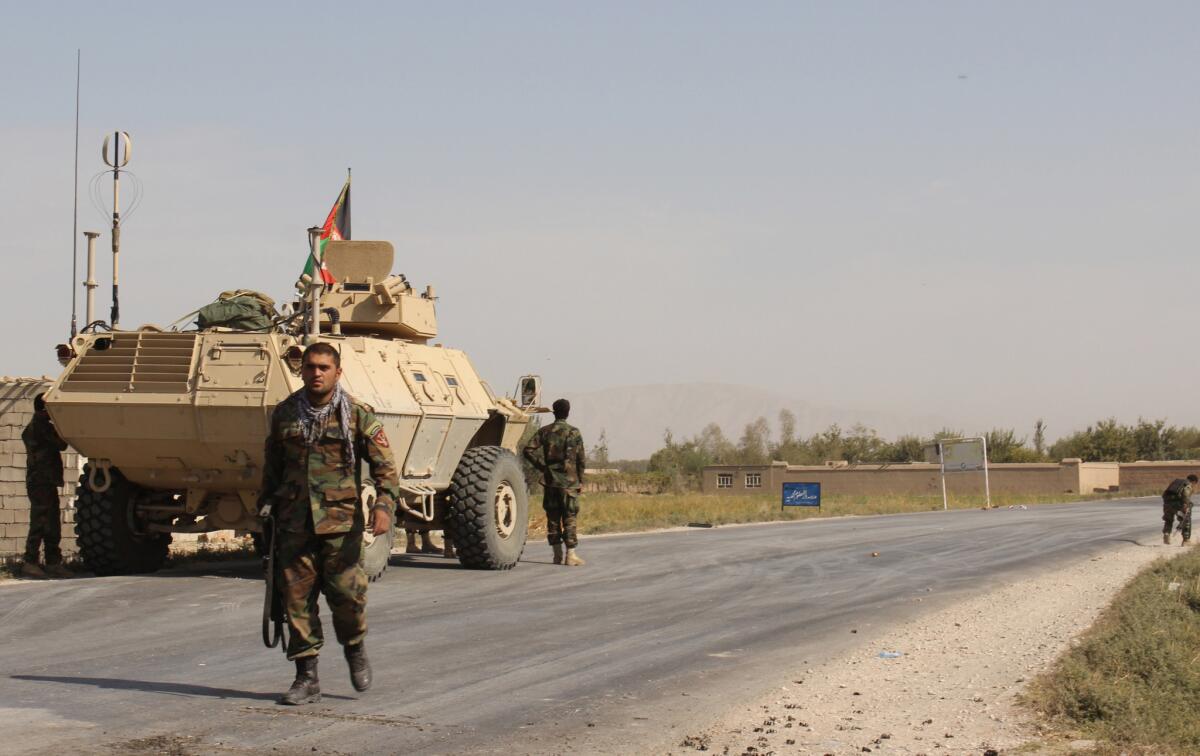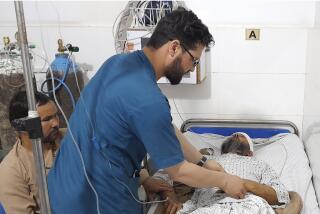Afghan forces hunt Taliban in Kunduz as militant leader claims ‘symbolic victory’

Afghan security forces take their positions during an Oct. 1 clash with Taliban fighters on the highway from Baghlan to Kunduz city, north of Kabul.
- Share via
reporting from Kabul, Afghanistan — Afghan forces were going door to door in Kunduz on Friday searching for Taliban fighters who had overtaken the northern city earlier in the week before a U.S.-backed government counterattack appeared to have flushed out most of the militants.
Residents reached by phone said the city’s streets were largely empty and that many people remained confined in their homes. Some Taliban militants reportedly were holed up in residential and multi-story buildings from which they continued to launch sporadic attacks.
The Afghan flag flew from the main traffic circle in the provincial capital of 300,000 people, but residents said they heard occasional gunfire coming from the direction of the governor’s office and police headquarters.
“The main roads of the city are still divided” between government- and Taliban-controlled areas, said Abdul Wadood Peyman, a member of parliament from Kunduz.
Thousands of Afghan soldiers, supported by U.S. military advisors, surged into Kunduz early Thursday and pushed back Taliban fighters who had taken over the city three days earlier. It was the first time the insurgent group had captured a major city since the 2001 U.S.-led invasion drove them from power, and one of the most significant military operations by a U.S. force that has been scaled down substantially since December.
Coalition officials said Friday that U.S. special forces troops traded fire with insurgents in Kunduz, one of the first times this year that U.S. service members have been involved in direct ground combat in Afghanistan.
The clash occurred Thursday in response to “an insurgent threat” and the U.S. forces acted “in self-defense,” said coalition spokesman Col. Brian Tribus. No U.S. service members were injured, he said.
A total of 9,800 U.S. troops remain in Afghanistan as part of a NATO training and advisory that is not supposed to involve combat, although officials said the troops are authorized to protect themselves when necessary.
Separately Friday, a U.S. C-130 cargo plane crashed at Jalalabad Airfield in eastern Afghanistan, killing all 11 on board, the U.S. Air Force said. Six U.S. service members and five civilian passengers died in the crash, which occurred at 12:19 a.m., officials said.
The Air Force said in a statement that the cause of the accident was under investigation. It was not immediately clear whether the crash was related to the Kunduz operation.
The Taliban’s new leader, Mullah Akhtar Mansoor, who assumed control of the organization two months ago, spoke to the Associated Press on Friday and called the capture of Kunduz “a symbolic victory” that was “celebrated by the ordinary people of the city.”
The Afghan Ministry of Public Health has recorded at least 466 injuries and 60 deaths in Kunduz, the vast majority of which were civilians. More than 6,000 people have fled the fighting, according to the United Nations, while those left behind in the country’s fifth-largest city face severe shortages of basic goods and skyrocketing prices of staples such as bread.
Representatives of local and international aid agencies said they had been targeted by Taliban militants, who looted their facilities and attacked staff members.
Among the worst affected agencies was the Kabul-based Women for Afghan Women, which said all of its facilities in Kunduz were raided by suspected Taliban fighters. Najia Nasim, the group’s country director, said the agency was “trying desperately” to get the organization’s more than 60 workers and their families out of the city.
As an organization that operates several safe houses for women, Nasim said her staff knew they would be among the first targeted by the Taliban, who had largely banned education and employment for women in the six years they ruled Afghanistan until 2001.
“Some of our staff have fled to Takhar province [to the east] or Kabul, but others are stuck in the fighting,” Nasim said. “What’s most worrying for us though, are the people we can’t reach due to lack of electricity.”
Nasim said her colleagues who could escape left everything behind and their empty houses have been ransacked or are serving as hideouts for Taliban fighters.
Although the Taliban tried to exude a more youthful, tolerant face -- posing for selfies with residents and publicly promising that no harm would come to residents -- unconfirmed reports from the city suggested more violent behavior. Peyman, the lawmaker, said government workers were targeted and “killed in plain sight, in front of their families and neighbors.”
In a phone interview, Peyman fell silent as he described “abuse against women,” including rape, that he said was committed by Taliban fighters.
President Ashraf Ghani, who has announced multiple investigations into the fall of Kunduz, has faced sharp questions over the failure of security forces in a strategic city that analysts said had been a Taliban objective for months. Security officials said Afghanistan’s Western-trained forces were initially slow to respond due to orders to protect civilians in a city where Taliban fighters had reportedly entered homes.
“The government will take back full control but the victory can’t have the dark cloud of civilian casualties looming over it; that’s why they are being so careful,” Peyman said.
Some Afghan officials have blamed the attack on Pakistan’s military spy agency, Inter-Services Intelligence, which has links to Taliban leadership. Peyman repeated government claims that foreign fighters -- including Pakistanis and Chechens -- were involved in the offensive, but did not deny that Afghans and local Taliban sympathizers also participated.
Many Kunduz residents have become disillusioned with the Afghan government in recent months over Ghani’s strategy to enlist private militias to help fight the Taliban, including some led by strongmen with long records of alleged human rights abuses.
“It’s become evident now that people within Kunduz helped the Taliban get in,” Peyman said.
Latifi is a special correspondent. Staff writer Bengali reported from Mumbai, India. Staff writer W.J. Hennigan contributed to this report from Washington.
For more news from Afghanistan, follow @SBengali on Twitter
More to Read
Sign up for Essential California
The most important California stories and recommendations in your inbox every morning.
You may occasionally receive promotional content from the Los Angeles Times.














